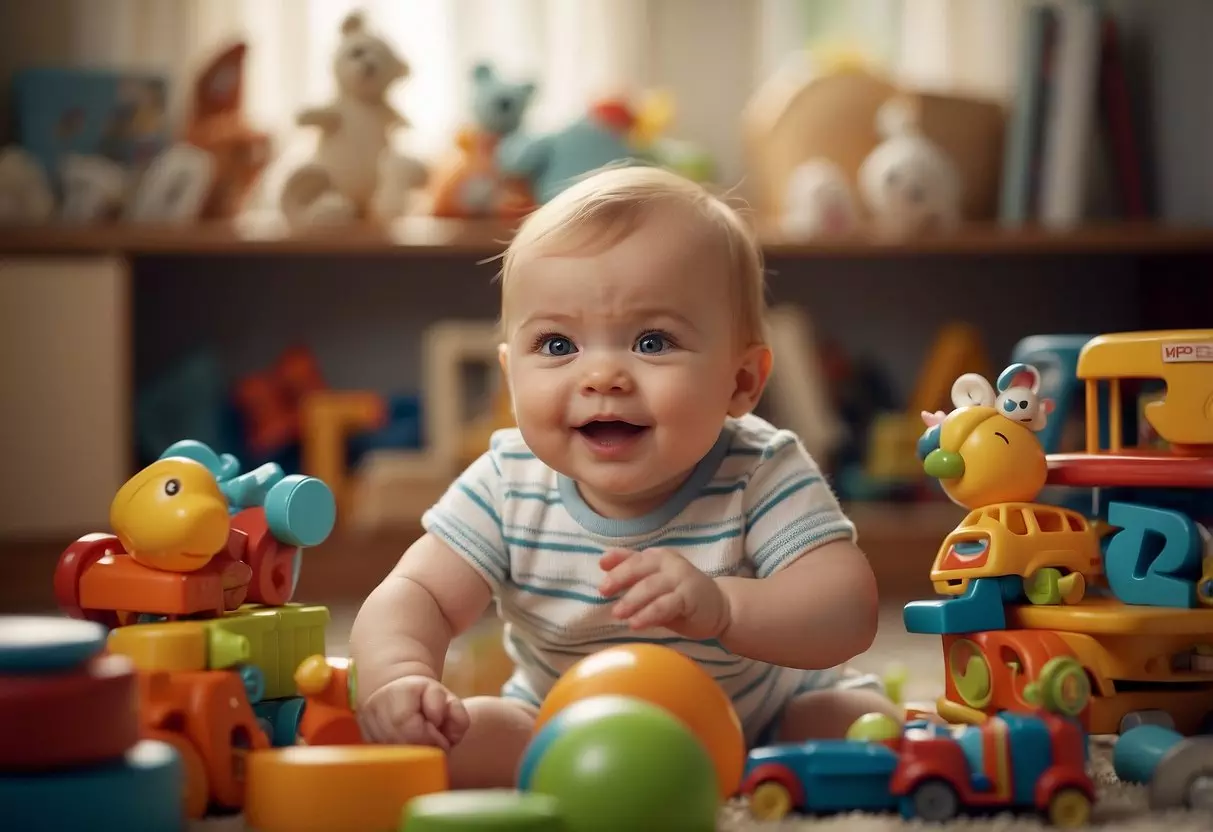How Many Words Should an 11-Month-Old Say? Milestones to Watch
Are you curious about your little one’s language development at 11 months old? At this age, babies are starting to make big leaps in their speech and communication skills. Most 11-month-old babies can say one or two simple words like “Mama” or “Dada.” They often use gestures, like pointing and nodding, to communicate what they need or want. These early efforts might be unclear, but they are essential milestones in your baby’s journey to learn how to talk.

You might notice your baby trying to imitate the words and sounds they hear from you and others around them. It’s common for them to produce sounds that resemble words, even if they’re not perfectly clear. For example, your baby might say “ba” when they mean “ball.” These attempts are exciting signs of progress and show how they are beginning to connect sounds with meanings.
Understanding how many words your baby should be saying helps you keep track of their growth and development. You might find it helpful to encourage their speech by talking to them often, reading books together, and naming objects around the house. By engaging with your baby in this way, you are helping them build the vocabulary and communication skills they will need as they continue to grow.
Table of Contents
Understanding Language and Speech Development
Babies experience significant changes in speech and language during their first year. At around 11 months, they begin to use and understand simple words and gestures, marking important development milestones.
Early Communication Milestones
From birth to 11 months, babies hit several speech and language milestones. Early in life, they coo and make gurgling sounds. By around 6 months, they start to babble, using repetitive sounds like “ba-ba” or “ga-ga.” These sounds are essential for the development of later speech skills.
At roughly 6 months, babies also begin to understand simple words like “no” and respond to changes in the tone of your voice. By 11 months, many babies start to say basic words such as “Mama” and “Dada”. They may also use gestures to communicate, such as pointing or waving. Tracking these milestones helps you support their language growth effectively.
Recognizing the First Sounds and Words
Around 11 months, your baby may start to say their first words, although these can be simple and not always clear. Common examples include “Mama” and “Dada,” but they might also attempt other basic words like “ball” or “dog”, often simplified to “ba” or “da”.
Babbling takes on more complex forms as babies combine sounds and begin imitation. They may use intonation patterns that resemble questions or statements. Besides words, gestures like pointing and waving are critical non-verbal communications. These signs show that your baby is starting to understand the link between words, actions, and objects. Encouraging these early attempts promotes further language development and helps babies express themselves more clearly.
Useful Links
- Pampers: Your 11-Month-Old’s Speech and Socializing
- Stanford Children’s Health: Age-Appropriate Speech and Language Milestones
- Huckleberry: 11 Month Old Baby Milestones
Encouraging Your Baby’s Language Skills

Boosting your baby’s language development involves engaging them with interactive activities and attentive communication.
Interactive Activities to Support Language
You can support your baby’s language skills through fun, interactive activities. Singing songs to your child is a great way to introduce simple words and keep them engaged. Songs with rhymes and repetitive phrases help your baby recognize sounds and words.
Reading to your baby every day is crucial. Choose books with colorful pictures and simple words. Point to the objects as you name them, and encourage your baby to mimic the sounds. Books with repetitive text can help reinforce vocabulary.
Talking to your child about everyday activities helps them connect words with actions and objects. For instance, narrate what you’re doing while cooking or shopping. Even if they can’t respond with words yet, these interactions build a strong foundation for language skills.
The Role of Parents and Caregivers
Parents and caregivers play a key role in encouraging language development. Responding to your baby’s gestures and babbling is important. When your baby makes a sound, repeat it back and add simple words. This back-and-forth communication teaches them that their sounds have meaning.
Use baby’s gestures as opportunities to introduce new words. For example, if your baby points to a toy, say the toy’s name and describe it. This helps connect the gesture with the vocabulary.
Create a language-rich environment by talking to your baby frequently. Describe what you are doing, ask questions, and patiently wait for their response. Even if they only respond with a gesture or a sound, this interaction promotes their speaking skills.
By consistently engaging with your baby through talking, reading, and singing, you can significantly boost their language abilities.
What to Expect From an 11-Month-Old

At 11 months, your baby is starting to communicate more and might say simple words like “Mama” or “Dada.” You can also notice them responding to directions and using gestures to express their needs.
Typical Speech and Language Abilities
By 11 months, many babies can say 1-2 words they understand, such as “Mama” and “Dada.” They are also starting to babble more complex sounds, like “ba-ba” or “da-da,” often without specific meaning. Besides words, your baby may use gestures like pointing, waving, and nodding to communicate.
It’s common for babies at this age to imitate sounds and try to replicate words they hear from adults. This stage is crucial for building their vocabulary and understanding how language works. Encouraging these attempts can foster their communication skills.
Signs of Healthy Language Development
Healthy language development at this age includes responding to simple directions. When you say “No,” your baby might pause their activity and look at you. They should also show engagement by turning toward sounds and voices. These responses indicate they understand more than they can express.
Another sign of healthy development is your baby’s ability to make gestures. Examples include waving “bye-bye” or pointing at objects they want. These actions are early forms of communication and show your baby is learning to express themselves.
Watching your baby try to mimic your words and sounds is a positive sign. It shows they are paying attention and learning to communicate. Providing a language-rich environment at home, with lots of talking and interaction, will support this growth.
When to Seek Professional Advice

It’s important to recognize when you might need to ask for professional help about your 11-month-old’s speech development. Paying attention to specific signs and consulting with healthcare professionals ensures that your child receives the support they might need.
Monitoring Speech Progress
Monitor your child’s speech milestones closely. By 11 months, your baby should typically say 1-2 simple words like “dada” or “mama” and use gestures such as pointing or waving. If your child isn’t meeting these milestones, it could be worth discussing with a healthcare professional.
Signs to watch for include:
- Lack of babbling or vocal sounds.
- Not responding to names or simple commands.
- Limited use of gestures like pointing or waving.
The American Speech-Language-Hearing Association provides guidelines on what is typical at this age. Observing these recommendations can help in identifying any red flags early.
Consulting With a Pediatrician
If you notice signs of delayed speech, talk to your child’s pediatrician. The American Academy of Pediatrics suggests discussing any concerns you have during regular check-ups.
The pediatrician might refer you to specialists like a speech-language pathologist for further evaluation. This professional can carry out detailed assessments and recommend necessary therapy. The Mayo Clinic outlines several types of interventions available for young children with speech delays.
Additionally, organizations like the National Institute on Deafness and Other Communication Disorders provide valuable resources and support for understanding speech and language development. They can help you learn more about what to expect and when to seek help.
